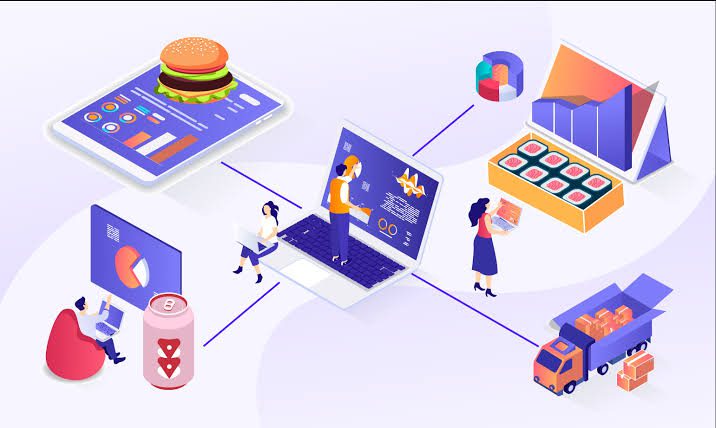The textile industry is renowned for its complexity, involving a multitude of intricate processes in the creation of fabrics. From sourcing raw materials to the various stages of manufacturing, packaging, and distribution, each step demands meticulous planning and precise execution. In the face of growing competition and heightened customer expectations, textile manufacturers find themselves compelled to optimize their operations and enhance overall efficiency. This is precisely where the significance of Enterprise Resource Planning (ERP) software comes to the forefront.
An ERP software solution functions as a comprehensive business management tool that seamlessly integrates all critical aspects of a company, ranging from financial operations and accounting to inventory control and production planning. This platform offers a unified space for overseeing business processes and enables real-time monitoring of operations. Within the textile industry, ERP software has brought about a revolutionary shift in the way manufacturers conduct their operations, providing them with a holistic perspective of their business activities.
In this blog post, we’ll delve into how ERP software for industrial automation benefits the textile industry. We’ll explore its role in optimizing operations, cutting costs, and boosting profitability for manufacturers. With the integration of ERP systems tailored to industrial automation, the textile sector can experience streamlined production processes and enhanced quality control. We’ll also highlight key ERP features specifically relevant to textiles in the context of industrial automation and offer guidance on choosing the right software. If you’re a textile manufacturer aiming to enhance efficiency, automation, and the bottom line, keep reading to learn about the advantages of ERP software.
Top Benefits of ERP Software in Textile Industry
Inventory Management: Textile companies can greatly improve their inventory control through the implementation of ERP software. This advanced system allows for real-time monitoring of inventory levels and timely notifications when supplies are depleting. By adopting this proactive strategy, these companies can effectively avert production delays and maintain a steady availability of crucial materials at all times.
Real-time Monitoring: ERP systems provide textile manufacturers with the ability to constantly track the progress of their production in real-time. This valuable feature enables them to promptly identify and resolve issues before they escalate into critical problems, thereby ensuring the uninterrupted and efficient flow of the manufacturing process.
Planning and Scheduling: The integration of ERP software within the textile manufacturing industry plays a pivotal role in refining the planning and scheduling of production operations. This integration empowers manufacturers to optimize production processes, and minimize downtime, resulting in lowered costs and amplified profitability.
Financial Management: ERP software offers an all-encompassing financial management system tailored to the needs of textile companies. This robust system streamlines financial operations by incorporating vital features including managing accounts payable, overseeing accounts receivable, maintaining the general ledger, and facilitating budgeting processes.
Cost Control: Leveraging ERP software empowers textile manufacturers to adeptly manage their expenditures by furnishing precise insights into production, inventory, and diverse operational dimensions of the business. This proficiency enables them to astutely pinpoint areas ripe for cost reduction and subsequently execute pertinent measures.
Resource Planning: The implementation of ERP software offers substantial assistance to textile manufacturers in refining their resource management strategies. Encompassing elements spanning from raw materials to labor allocation, this technology empowers them to fine-tune production operations and curtail unnecessary wastage effectively.
Traceability: By incorporating an ERP system, textile manufacturers gain the ability to meticulously track their products at every stage of production. This valuable functionality empowers them to not only uphold rigorous quality standards but also to seamlessly adhere to regulatory mandates.
Quality Control: The integration of ERP software within textile manufacturing empowers companies to uphold impeccable quality standards. By offering real-time insights into the production process, manufacturers can promptly detect and proactively resolve potential quality issues before they escalate into critical challenges.
Customer Management: The implementation of ERP software empowers textile manufacturers to optimize their customer interactions, encompassing tasks ranging from efficient order processing to providing comprehensive post-sales support.
Supply Chain Management: In the realm of textile manufacturing, ERP (Enterprise Resource Planning) software plays a pivotal role in elevating the efficacy of supply chain management operations. This encompasses a comprehensive array of tasks, spanning from adept supplier management to the seamless orchestration of logistics and transportation intricacies. The integration of ERP in supply chain management enhances visibility, streamlines processes, and promotes data-driven decision-making, ultimately leading to improved operational efficiency and better coordination across the entire supply chain.
Compliance Management: The implementation of ERP software empowers textile manufacturers to effectively meet a diverse array of industry regulations and standards, spanning from environmental mandates to labor laws.
Data Management: With ERP software, textile manufacturers gain access to a centralized data management system that streamlines the storage and retrieval of a diverse array of information. This encompasses everything from vital production data to crucial financial records.
Reporting: Within the realm of textile manufacturing, ERP software offers robust reporting mechanisms, empowering manufacturers to delve into data comprehensively and thus, arrive at knowledgeable judgments. This comprehensive suite encompasses an array of reports, encompassing insights into production as well as comprehensive financial summaries.
Scalability:The flexibility of ERP software shines in its scalability, empowering textile manufacturers to seamlessly integrate new features and functions as their business flourishes. This dynamic capability ensures the software’s continued pertinence and optimal performance throughout the expansion of their operations.
Integration: The ERP software can be effectively integrated with other software systems, including warehouse management systems, enabling a fluid and uninterrupted exchange of data throughout the entire span of the business operations.
Mobility: As the reliance on mobile devices grows within work settings, ERP software offers unrestricted access, enabling textile manufacturers to effectively steer their business activities even while away from their desks.
Conclusion
ERP software has evolved into a crucial asset for textile manufacturers, delivering a multitude of benefits that enhance efficiency, curtail expenses, and amplify profitability. By adopting an apt ERP system, textile firms can outpace competition and thrive within an ever-evolving industry landscape. The incorporation of ERP software empowers textile manufacturers to attain these transformative outcomes.



































